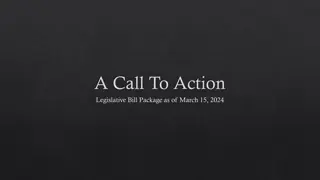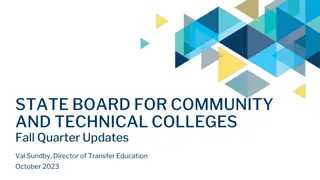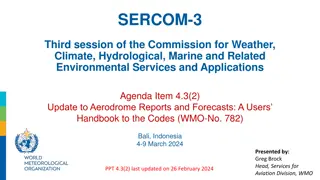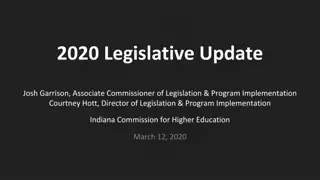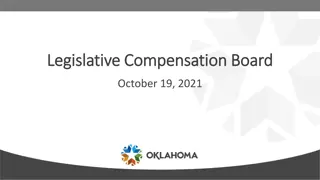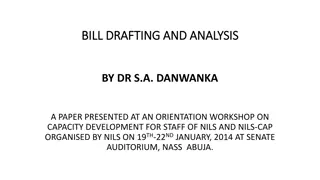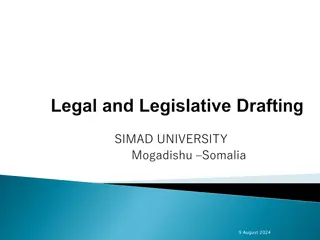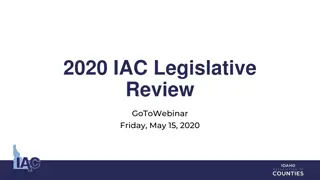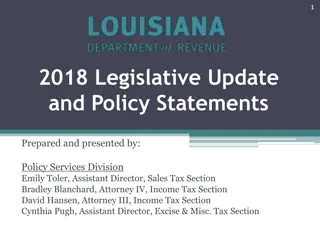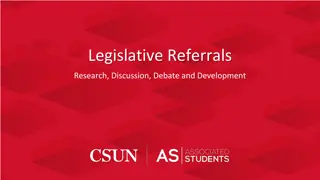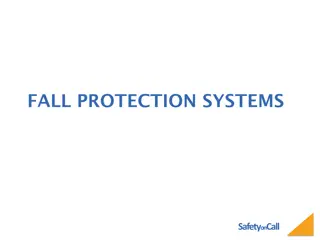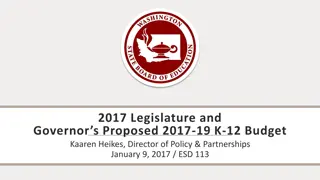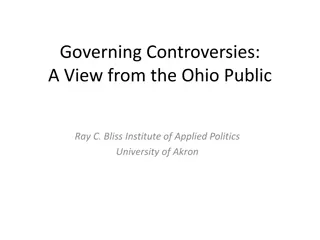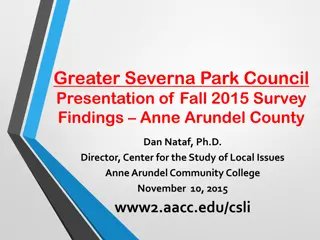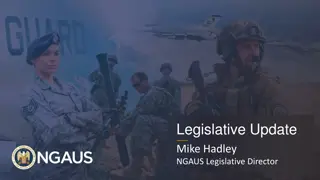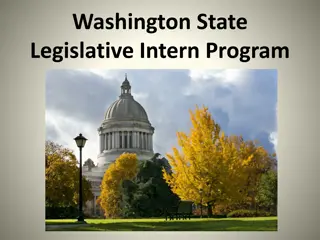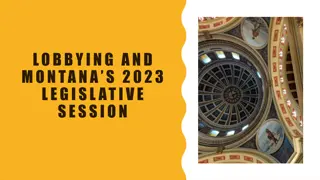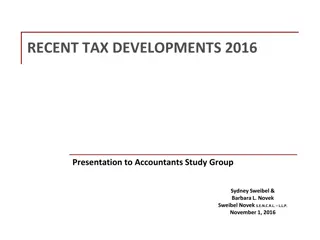CASC 2020 Legislative Update: Special Session Fall 2020 Summary
This presentation covers the impact of legislation from the 2020 General Assembly Fall Special Session on law enforcement and public safety. It delves into topics such as the use of force, traffic stops, marijuana laws, search warrants, hiring practices, decertification, civilian review boards, data collection, criminal procedures, offenses, sentencing changes, and restrictions on equipment. The effective date of the legislation discussed is March 1, 2021. Specific bills like SB 5030 regarding the use of deadly force are outlined, emphasizing the conditions under which law enforcement officers can use lethal measures. Various factors are considered to determine the appropriateness of deadly force in different situations.
Download Presentation

Please find below an Image/Link to download the presentation.
The content on the website is provided AS IS for your information and personal use only. It may not be sold, licensed, or shared on other websites without obtaining consent from the author. Download presentation by click this link. If you encounter any issues during the download, it is possible that the publisher has removed the file from their server.
E N D
Presentation Transcript
CASC 2020 Legislative Update: Special Session Fall 2020
Materials This PowerPoint attempts to identify the legislation from the 2020 General Assembly Fall Special Session that has the greatest impact on law enforcement and public safety. Consult the 2020 Special Session Legislative Update Master List outline for full listing of bills of interest.
Materials You must rely only upon the final language of the bill after passage. You can find the bill on the LIS website at: http://lis.virginia.gov/lis.htm.
Topics for this Presentation Use of Force Traffic Stops Marijuana Stops & Searches Search Warrants Hiring and Decertification Civilian Review Boards Data Collection Criminal Procedure Crimes & Offenses Sentencing Changes Restrictions on Equipment
Note: Effective Date of Legislation All legislation from the Special Session, unless otherwise noted in this presentation, is effective on March 1, 2021.
Use of Force NEW RULES AND STATUTES
SB 5030: Use of Deadly Force A law-enforcement officer shall not use deadly force against a person unless: 1. The law-enforcement officer reasonably believes that deadly force is immediately necessary to protect the law-enforcement officer or another person, other than the subject of the use of deadly force, from the threat of serious bodily injury or death; 2. If feasible, the law-enforcement officer has provided a warning to the subject of the deadly force that he will use deadly force; 3. The law-enforcement officer's actions are reasonable, given the totality of the circumstances; and 4. All other options have been exhausted or do not reasonably lend themselves to the circumstances.
In determining whether deadly force was proper, the following factors shall be considered: 1. The reasonableness of the law-enforcement officer's belief and actions from the perspective of a reasonable law-enforcement officer on the scene at the time of the incident; and 2. The totality of the circumstances. (See next slide for factors)
Totality of the Circumstances includes: the amount of time available to the law-enforcement officer to make a decision; whether the subject of the use of deadly force (a) possessed or appeared to possess a deadly weapon and (b) refused to comply with the law-enforcement officer's lawful order to surrender an object believed to be a deadly weapon prior to the law-enforcement officer using deadly force; whether the law-enforcement officer engaged in de-escalation measures prior to the use of deadly force, including taking cover, waiting for backup, trying to calm the subject prior to the use of force, or using non-deadly force prior to the use of deadly force; iv. whether any conduct by the law-enforcement officer prior to the use of deadly force intentionally increased the risk of a confrontation resulting in deadly force being used; and the seriousness of the suspected crime. i. ii. iii. v.
SB 5030: Prohibited Acts The willful discharge of a firearm by a law-enforcement officer into or at a moving vehicle is prohibited unless the discharge of a firearm is immediately necessary to protect the law-enforcement officer or another person from death or serious bodily injury. The use of kinetic impact munitions by a law-enforcement officer is prohibited unless the use of kinetic impact munitions is necessary to protect the law-enforcement officer or another person from bodily injury. "Kinetic impact munitions" includes impact rounds and baton rounds, such as rubber batons, bean bag rounds, foam baton rounds, and plastic, wax, wood, or rubber-coated projectiles.
Penalty for Violation In addition to any other penalty authorized by law, any law-enforcement officer who knowingly violates the provisions of this chapter shall be subject to disciplinary action, including dismissal, demotion, suspension, or transfer of the law-enforcement officer or decertification as provided in subsection D of 15.2-1707.
HB 5069 / SB 5030: Prohibition on Neck Restraints "Neck restraint" means the use of any body part or object to attempt to control or disable a person by applying pressure against the neck, including the trachea or carotid artery, with the purpose, intent, or effect of controlling or restricting the person's movement or restricting the person's blood flow or breathing, including chokeholds, carotid restraints, and lateral vascular neck restraints.
Prohibition in HB 5069 RULE: The use of a neck restraint by a law-enforcement officer is prohibited unless the use of a neck restraint is immediately necessary to protect the law-enforcement officer or another person. (but see next slide for further restriction). PENALTY: In addition to any other penalty authorized by law, any law-enforcement officer who knowingly violates the provisions of this chapter shall be subject to disciplinary action, including dismissal, demotion, suspension, or transfer of the law-enforcement officer or decertification as provided in subsection D of 15.2-1707.
SB 5030 Further Expands Restriction Rule: The use of a neck restraint by a law- enforcement officer is prohibited unless the use of a neck restraint is immediately necessary to protect the law-enforcement officer or another person from death or serious bodily injury. Penalty is the same.
HB 5029 / SB 5030: Intervention in Excessive Force Defines Excessive Force : "Excessive force" means any force that is objectively unreasonable given the totality of the circumstances, including the severity of the crime at issue, whether the suspect poses an immediate threat to the safety of the officers or others, and whether the suspect is actively resisting arrest or attempting to evade arrest by flight.
HB 5029/ SB 5030 (cond): Reqt to Intervene 19.2-83.4(A): Any law-enforcement officer who, while in the performance of his official duties, witnesses another law- enforcement officer engaging or attempting to engage in the use of excessive force against another person shall intervene, when such intervention is feasible, to end the use of excessive force or attempted use of excessive force, or to prevent the further use of excessive force. A law-enforcement officer shall also render aid, as circumstances objectively permit, to any person injured as the result of the use of excessive force.
HB 5029 (cond): Reqt to Report 19.2-83.4 (B) - Any law-enforcement officer who intervenes pursuant to subsection A or who witnesses another law- enforcement officer engaging or attempting to engage in the use of excessive force against another person shall report such intervention or use of excessive force in accordance with the law-enforcement officer's employing agency's policies and procedures for reporting misconduct committed by a law- enforcement officer. No employing agency shall retaliate, threaten to retaliate, or take or threaten to take any disciplinary action against a law- enforcement officer who intervenes pursuant to subsection A or makes a report pursuant to this subsection.
HB 5029: Penalties for Failure to Intervene / Report 19.2-83.5: In addition to any other penalty authorized by law, any law-enforcement officer who knowingly violates the provisions of this chapter shall be subject to disciplinary action, including dismissal, demotion, suspension, or transfer of the law- enforcement officer or decertification as provided in subsection D of 15.2-1707.
Traffic Stops LIMITATIONS ON AUTHORITY
HB 5058 / SB5029: Limitations on Traffic Stops Creates a list of certain traffic offenses for which: No law-enforcement officer, as defined in 9.1-101, shall stop a motorcycle, moped, motorized skateboard, or scooter for a violation of these sections. No evidence discovered or obtained as the result of a stop in violation of [one of these sections], including evidence discovered or obtained with the operator's consent, shall be admissible in any trial, hearing, or other proceeding.
Offenses on this list: Requirement to display 2 visibly red tail lights. Requirement for a supplemental high mount stop light. Improper window tint. Obstructed view Statute also now requires that the view be substantially obstructed.
Offenses on this list: (cond) Nonworking exhaust system. Noise from a motorcycle, moped, or motorized skateboard or scooter, which is not equipped with a muffler and exhaust system. Driving outside the scope or terms of a provisional driver's license or learner s permit. Driving on a provisional driver s license or learner s permit while using any cellular telephone or any other wireless telecommunications device, regardless of whether such device is or is not hand-held. Smoking with a child in a vehicle. Failure to wear a seatbelt.
Change to Brake Light Requirement No law-enforcement officer shall stop a motor vehicle, trailer, or semitrailer for a violation of this section, except that a law-enforcement officer may stop a vehicle if it displays no brake lights that meet the requirements set forth in subsection A. A: Requires at least two brake lights of a type approved by the Superintendent, that automatically exhibit a red or amber light plainly visible in clear weather from a distance of 500 feet to the rear of such vehicle when the brake is applied. The new exclusionary rule added as well, as in other parts.
Change to Headlight Requirement 46.2-1030 sets forth when you must activate headlights. New: No law-enforcement officer shall stop a motor vehicle for a violation of this section, except that a law-enforcement officer may stop a vehicle if it displays no lighted headlights during the time periods set forth in subsection A. from sunset to sunrise; during any other time when, because of rain, smoke, fog, snow, sleet, insufficient light, or other unfavorable atmospheric conditions, visibility is reduced to a degree whereby persons or vehicles on the highway are not clearly discernible at a distance of 500 feet; and whenever windshield wipers are in use as a result of fog, rain, sleet, or snow. The provisions of this subsection, however, shall not apply to instances when windshield wipers are used intermittently in misting rain, sleet, or snow. The new exclusionary rule added as well, as in other parts. i. ii. iii.
Change to Defective Equipment Code is changed: It shall be unlawful for any person to use or have as equipment on a motor vehicle operated on a highway any device or equipment mentioned in 46.2-1002 which is defective AND in an unsafe condition. Previous code section said Or No law-enforcement officer shall stop a motor vehicle for a violation of this section. No evidence discovered or obtained as the result of a stop in violation of this subsection, including evidence discovered or obtained with the operator's consent, shall be admissible in any trial, hearing, or other proceeding.
Change to Expired Registration E. No law-enforcement officer shall stop a motor vehicle due to an expired registration sticker prior to the first day of the fourth month after the original expiration date. No evidence discovered or obtained as the result of a stop in violation of this subsection, including evidence discovered or obtained with the operator's consent, shall be admissible in any trial, hearing, or other proceeding.
Change to Inspection Requirement No law-enforcement officer shall stop a motor vehicle due to an expired vehicle inspection sticker until the first day of the fourth month after the original expiration date. No evidence discovered or obtained as the result of a stop in violation of this subsection, including evidence discovered or obtained with the operator's consent, shall be admissible in any trial, hearing, or other proceeding.
Jaywalking 46.2-923 and 46.2-926. Non-Enforcement No law-enforcement officer shall stop a pedestrian for a violation of this section. No evidence discovered or obtained as the result of a stop in violation of this subsection, including evidence discovered or obtained with the person's consent, shall be admissible in any trial, hearing, or other proceeding.
Limitations on Local Ordinances No locality may provide that a violation of a provision of a traffic ordinance is cause for a stop or arrest of a driver when such a stop or arrest is prohibited for a similar offense under the provisions of the Virginia driving code. No law-enforcement officer shall stop a motor vehicle for a violation of a local ordinance relating to the ownership or maintenance of a motor vehicle unless such violation is a jailable offense. No evidence discovered or obtained as the result of a stop in violation of this subsection, including evidence discovered or obtained with the operator's consent, shall be admissible in any trial, hearing, or other proceeding.
Marijuana Stops and Searches RESTRICTIONS ON LAW ENFORCEMENT AUTHORITY
HB 5058 / SB5029: Limitation on Plain Smell No law-enforcement officer, as defined in 9.1-101, may lawfully stop, search, or seize any person, place, or thing solely on the basis of the odor of marijuana, and No evidence discovered or obtained pursuant to a violation of this subsection, including evidence discovered or obtained with the person's consent, shall be admissible in any trial, hearing, or other proceeding.
Where Plain Smell Still Applies: The provisions of the previous rule shall not apply in: any airport as defined in 5.1-1, or if the violation occurs in a commercial motor vehicle as defined in 46.2-341.4.
Search Warrants NEW RESTRICTIONS AND REGULATIONS
HB 5099 / SB 5030 Prohibition on No-Knock Search Warrants. B. No law-enforcement officer shall seek, execute, or participate in the execution of a no-knock search warrant. A search warrant authorized under this section shall require that a law-enforcement officer be recognizable and identifiable as a uniformed law-enforcement officer and provide audible notice of his authority and purpose reasonably expected to be heard by occupants of such place to be searched prior to the execution of such search warrant.
New Requirements for Service After entering and securing the place to be searched and prior to undertaking any search or seizure pursuant to the search warrant, the executing law-enforcement officer shall read and give a copy of the search warrant to the person to be searched or the owner of the place to be searched or, if the owner is not present, to any occupant of the place to be searched. If the place to be searched is unoccupied, the executing law- enforcement officer shall leave a copy of the search warrant suitably affixed to the place to be searched.
Limitations on Time of Day Search warrants authorized under this section shall be executed only in the daytime unless (i) a judge or magistrate, if a judge is not available, authorizes the execution of such search warrant at another time for good cause shown or (ii) the search warrant is for the withdrawal of blood. A search warrant for the withdrawal of blood may be executed at any time of day. Note: For out-of-state warrants, use Eastern Time Zone per Va. Code 1-253.
Non-Compliance A law-enforcement officer shall make reasonable efforts to locate a judge before seeking authorization to execute the warrant at another time. Such reasonable efforts shall be documented in an affidavit and submitted to a magistrate when seeking such authorization. Any evidence obtained from a search warrant in violation of this subsection shall not be admitted into evidence for the Commonwealth in any prosecution.
HB 5051 / SB 5030: Decertification of a Law Enforcement Officer Requires DCJS to adopt statewide professional standards of conduct applicable to all certified law- enforcement officers and certified jail officers and appropriate due process procedures for decertification based on serious misconduct in violation of those standards; and
LEO agency shall notify the Board in writing within 48hrs of becoming aware that any employee who resigned or was if any certified law- enforcement or jail officer currently employed by his agency: (i) is terminated or resigns in advance of being convicted or found guilty of an offense that requires decertification or who resigned or was, (ii) is terminated or resigns in advance of a pending drug screening, (iii) is terminated or resigns for a violation of state or federal law, (iv) is terminated or resigns for engaging in serious misconduct as defined in statewide professional standards of conduct adopted by the Board, (v) is terminated or resigns while such officer is the subject of a pending internal investigation involving serious misconduct as defined in statewide professional standards of conduct adopted by the Board, or (vi) is terminated or resigns for an act committed while in the performance of his duties that compromises an officer's credibility, integrity, honesty, or other characteristics that constitute exculpatory or impeachment evidence in a criminal case.
HB 5051 (Cond): New Process for Board-Initiated Decertification The Board may initiate decertification proceedings against any current or former law-enforcement or jail officer whom if the Board has found that any basis for the officer's decertification exists under the previous list or due to a specified criminal conviction or due to a drug screening or failure to comply with training requirements. Note that any finding of misconduct listed in the previous slide will not be considered final until all grievances or appeals have been exhausted or waived and the finding of misconduct is made final.
HB 5104 & SB 5030: Minimum Standards & Disclosure of Information When hiring a new officer, agency shall shall request and obtain from all prior employing law-enforcement agencies or jails any information (i) related to an arrest or prosecution of a former officer, including any expunged arrest or criminal charge known to the agency (ii) related to a civil suit regarding a former officer's employment or performance of his duties; (iii) obtained during the course of any internal investigation related to a former officer s alleged criminal conduct, use of excessive force, or other official misconduct; and (iv) related to a former officer s job performance that led to such officer's or deputy sheriff's resignation, dismissal, demotion, suspension, or transfer.
Requirement to Disclose Any sheriff or chief of police in the Commonwealth, any director or chief executive of any law-enforcement agency or jail in the Commonwealth, and the Director of the Department of Criminal Justice Services or his designee who receives such request for information shall disclose such requested information within 14 days of receiving such request to the requesting hiring law-enforcement agency or jail. Statute provides immunity, unless the information disclosed by the former employer was knowingly false or deliberately misleading, was rendered with malicious purpose, or violated any civil right of the former employee or appointee.
Psychological Examination A hiring law-enforcement agency or jail may require a candidate for employment to undergo a psychological examination, subsequent to a conditional offer of employment, conducted under the supervision of a licensed psychiatrist or a licensed clinical psychologist. DCJS shall establish guidelines for that process.
Civilian Review Boards NEW OPTIONS FOR LOCALITIES
HB 5055 / SB 5035: Civilian Review Boards Permits (does not require) localities to create civilian review boards for law enforcement agencies, including campus police. Removes the protections under the Law- Enforcement Officers Procedural Guarantee Act whenever a locality has established a civilian review board. Replaces with local grievance procedure (see upcoming slide).
Civilian Review Boards May: Investigate and issue findings on complaints; Investigate and issue findings on incidents, including use of force, serious abuse of authority or misconduct, allegedly discriminatory stops, and other incidents; Investigate policies, practices, and procedures of law- enforcement agencies Make recommendations regarding changes to policies, practices, and procedures. May request reports of the annual expenditures of the law- enforcement agencies serving under the authority of the locality and make budgetary recommendations to the governing body of the locality concerning future appropriations;
Civilian Review Boards & Internal Affairs Review Boards may review all investigations conducted internally by law-enforcement agencies serving under the authority of the locality, including internal investigations of civilians employed by such law- enforcement agencies, May issue findings regarding the accuracy, completeness, and impartiality of such investigations and the sufficiency of any discipline resulting from such investigations.
Civilian Review Boards May: Make binding disciplinary determinations in cases that involve serious breaches of departmental and professional standards, as defined by the locality. Disciplinary determinations may include: letters of reprimand, suspension without pay, suspension with pay, demotion within the department, reassignment within the department, termination, involuntary restitution, or mediation, any of which to be implemented by the local government employee with ultimate supervisory authority over officers or employees of law-enforcement agencies serving under the authority of the locality.
Catchall Power: A locality may also grant a review boards the power to undertake any other duties as reasonably necessary for the law-enforcement civilian oversight body to effectuate its lawful purpose as provided for in this section to effectively oversee the law- enforcement agencies serving under the authority of the locality.



